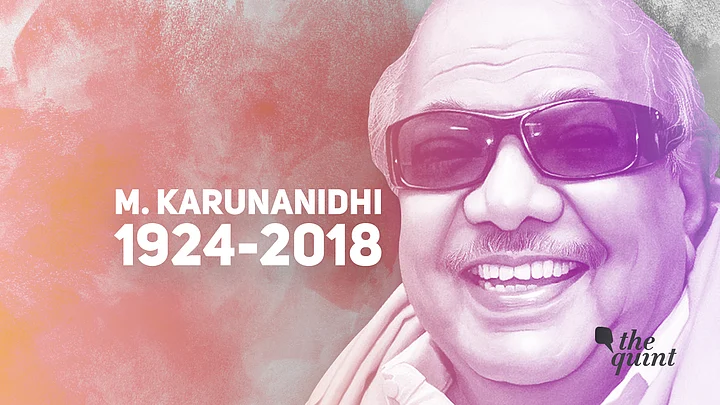Karunanidhi, the script writer of Dravidian politics, who outlived powerful stars that challenged him over the last six decades, has finally departed. There are perhaps no parallels in Indian politics to Karunanidhi’s ability to endure defeats, enjoy success and survive at the helm of a state’s polity for over six decades.
Since 1957, when Muthuvel Karunanidhi and his party, the Dravida Munnetra Kazhagam (DMK) first contested assembly elections, the tall Dravidian leader never lost an election to the assembly. Even when his party was routed, he won his seat, thus, creating a record for being an MLA 13 times. In five of those terms, Karunanidhi was Chief Minister of Tamil Nadu.
Muthuvel Karunanidhi’s dialogues, scripts and oratory genius may be lost in translation to the rest of India, but to Tamil speakers, it will always be a class apart.
The emotion that he brought for the language, and his command over it — was the foundation on which he built an enormous political career.
Any journalist who has reported on the DMK would have several stories of how Karunanidhi deflected complex situations with his wit.
For instance, in the run up to the 2009 Lok Sabha elections, Karunanidhi, in an interview to NDTV, had called slain LTTE chief Velupillai Prabhakaran “a good friend”. Being an ally of the Congress at that time, the comment created a major political controversy.
Kalaignar’s Unmatched Wit & Charisma
At that time, I was working for a competing TV network, and in an attempt to catch up with competition had cornered Karunanidhi as he got off his convoy. When we rushed the camera to him and asked him in Tamil “If he really meant that Prabhakaran was a friend, and wouldn’t the statement strain his alliance with the Congress and Mrs Sonia Gandhi” — Karunanidhi shot back, “Even you are a friend, and journalists cause more strain in our alliance!”
A day later, Karunanidhi told reporters, that he “cannot forgive the LTTE for the Rajiv Gandhi assassination”. This incident only reflects his great ability to manipulate situations to balance core ideological positions of Dravidian politics, and coalition compulsions in New Delhi.
Very few leaders, perhaps none, could have gotten away with taking both sides on an issue as emotive as the LTTE which was responsible for Rajiv Gandhi’s assassination.
It’s this ability that ensured that the DMK remained a part of coalition governments headed by the BJP and the Congress between 1999 and 2012.
But with great success comes great failures as well. Karunanidhi’s need to remain the undisputed leader of the DMK meant that challengers, even potential challengers, had to be thwarted. This is what turned a party that emerged from the grassroots as a democratic social justice force, into one that unhealthily revolves around the Karunanidhi family.
The DMK was not the ‘family party’ that it is today, when its founder CN Annadurai, popularly called ‘Anna’ or ‘big brother’ in Tamil, passed away in 1969. A young Karunanidhi, who emerged from the grassroots anti-Hindi agitation, was one of Anna’s trusted lieutenants, but there were others in the party who were equally popular, if not more.
Interestingly, it was with the support of the enormously charismatic and popular star-turned-politician MG Ramachandaran (MGR), that Karunanidhi managed to take over a post-Annadurai DMK.
Power Struggle in DMK Post Kalaignar’s Death
After the 1971 elections, which saw M Karunanidhi return as Chief Minister, MGR, split the DMK to form the All India Anna Dravida Munnetra Kazhagam (AIADMK), in 1972. Differences between the star and the script writer had come to a full blown confrontation.
Their battle was the foundation for the personality-obsessed politics of Tamil Nadu today.
MGR never lost power and remained chief minister till his demise in 1988. This period was perhaps the biggest test for the DMK president, and Karunanidhi weathered a decade-long MGR storm without losing control of the party.
Having survived MGR, the next chapter in his life was the rivalry with Jayalalithaa who succeeded MGR, and that rivalry dominated Tamil Nadu politics for nearly three decades when the state was a see-saw, battling between J and K! Eventually, Karunanidhi outlived Jayalalithaa, who passed away in 2017.
What he leaves behind now is a large, complex and convoluted family that has a desperate craving for power. Karunanidhi has six children from three marriages.
MK Stalin, second son from the DMK patriarch’s marriage to Dayaluammal, is the undisputed successor, and has a firm hold over the party. Stalin has had his share of grassroots political experience, and his succession has been asserted and re-asserted over the last two decades.
However, Stalin’s real test would be to take the party to power. In the last assembly elections, in 2016, the DMK fought under his leadership for the first time, but lost to late Chief Minister Jayalalithaa. Thus, there is no evidence that he has the ability to lead the party to power.
Also, Tamil Nadu had only seen a Karunanidhi versus Jayalalithaa battle for the last two decades.
In the absence of the two, it is not clear if conventional political arithmetic will survive in the state. Star entrants like Rajnikanth and Kamal Haasan will also have an impact. In every sense, the star cast and script in Tamil Nadu has changed dramatically.
Further, Stalin’s brother MK Azhagiri has been a troublemaker in the party, and Karunanidhi’s daughter Kanimozhi has her own political ambitions. The power equations within the siblings are constantly changing, and it was the father who had kept the family and party glued together.
In effect, without the powerful script writer, it’s not clear how the next act in the often melodramatic Dravidian political drama will unfold.
(The writer is an independent journalist. He can be reached @TMVRaghav . This is an opinion piece and the views expressed above are the author’s own. The Quint neither endorses nor is responsible for the same.)
